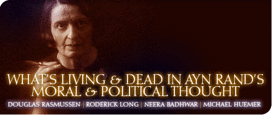I guess I will comment on the “survival vs. flourishing” debate. This is, briefly, how it seems to me.
1.There probably is no answer to the question, which is correct as an interpretation of Rand. Rand probably did not have a settled position herself, and thought different things at different times.
2. The important question, however, is not which view is Rand’s, but which view is more likely true. On this, I think:
a) The flourishing view is much more ethically plausible. I don’t think I would have been impressed with Atlas Shrugged if the heroes were just centenarians going around reading actuarial tables to figure out how to maximize their life expectancy.
b) The survival view is more clearly connected to the metaethical foundations Rand seems to be trying to lay, and the effort to avoid the is/ought gap. With the flourishing view, it is much more clear that you’re going to have to rely on ethical intuition.
3. Apropos of the last point, it has never been clear to me how we are supposed to know what constitutes flourishing. Suppose I want to know whether observing the non-initiation of force principle is part of “flourishing.” Is there an empirical test I can perform? Do I just rely on intuition?

